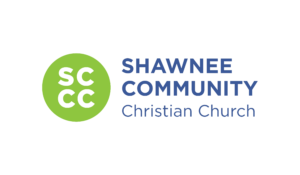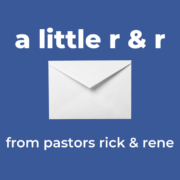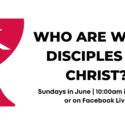a little r & r

Happy Pentecost! Happy Birthday, Church!!
Yes, last Sunday, the 23rd, we celebrated Pentecost Day in worship, the Birthday of the Church. It is the day the Holy Spirit in the form of Tongues of Fire (hence, the color red for commemorating the day) and the Dove, came down from heaven.
The Book of Acts 2:1-21 tells the story of the original Pentecost and birth of the church. The disciples were huddled in a room scared to death of what they were going to do now Jesus was crucified and risen from the dead, but no longer physically present. The imposition of the Holy Spirit, hovering over Jesus’ followers kick-started the church. The Book of Acts (written by the gospel writer Luke) became the central biblical document for us members of the Christian Church (Disciples of Christ), often referred to as the DOC. But Celtic Christianity, such as the Iona Community in Scotland, doesn’t speak of the Holy Spirit as a Dove but as a Wild Goose, capturing the untamable Holy Spirit.
Here’s the thing: we DOC have never quite known what to do with this wild, unpredictable Holy Spirit, the 3rd person of the Trinity after God, the 1st person, the Creator (the “Father”) and the 2nd person, the Redeemer (Christ, the Son). We DOC are okay talking about and praying to and with our Creator God and our Savior Jesus; but the Holy Spirit? Not so much.
We come to this uneasiness honestly. As inheritors of the Protestant Reformation of the early 16th century, with great Reformers like Martin Luther and John Calvin, Protestantism’s finest minds, it’s easy to understand how much more comfortable we are with a highly rational, cognitive faith. I think it’s part of the reason we Disciples have so many teachers in our congregations.
Jesus is, after all, the Logos, God’s Word made flesh (John 1:14-18). So, we tend to be comfortable with scientific-humanistic words ending in –ology (from the Greek word “Logos”). The dialogue between faith and reason is something we’re comfortable with. So when we go to church, we don’t expect to park our minds at the door, but take them in with us into worship.
Besides, the Protestant Reformation might never have happened, and our denomination never have been founded without the invention of the Guttenberg printing press. The printing press made the scriptures accessible to laypeople—not just to us clergy—resulting in the importance of literacy and education throughout the western world.
But we DO have trouble with believers who DO park their minds at the door and want only an immediate, ecstatic experience of God! We DOC DO have trouble with those who insist that faith isn’t really faith unless it is blind, leaving no space for thinking and hearing and seeing. Sometimes these believers are pejoratively called “Holy Rollers.”
Which returns us to the uneasiness we Mainline Disciples and Protestants have with the Holy Spirit and Pentecost. I can still remember the Pentecostal church around the corner from the Disciples church I served in southern Indiana. The women dressed in dowdy clothes, the men in the best suits. A few years later in a different church I took our youth to a Pentecostal service where people spoke in tongues, raised their hands, and danced in the aisles. Our youth responded by looking like I’d taken them on a trip to another planet.
The sad part is: we Disciples, among many others, still are unsure what to do with the Holy Spirit. We tend to treat it as a stepchild; only welcoming the Holy Spirit so long as it acts with decorum. Along with this uncertainty of what to do with the 3rd person of the Trinity, the very word “spirituality” has largely become alien to us. I include myself in this description.
So, what do we do with the Holy Spirit?
One thing we can do is appreciate the power of the invisible. After all, we’ve just spent the past 15 months ducking something we can’t see, except under a microscope—Covid-19! Though Covid is proof that what we can’t see can kill us! Respect for the invisible really has a place in our faith.
The scriptures know of the Spirit’s invisibility. The Greek word for “Spirit” is pneuma,” as in “pneumonia.” The connection between the Greek and the English is obvious. “Pneuma” can be translated either “spirit” or “breath,” as in the great old hymn “Breathe On Me, Breath of God.” The hymn is just another way of saying, “Come, Invisible Spirit, Come!”
Still connecting the Holy Spirit with pneumonia makes the Spirit sound intimidating and negative…until we realize that spirituality, as a colleague of mine once remarked, has to do with the quality of our relationships. The Holy Spirit is about healing relationships.
So, when the Day of Pentecost came and each participant could understand the voice of God in her or his own native language, it was a day when everyone stood in right relationship with God and with one another. The Day of Pentecost has often been referred to as a reversal of the day at the Tower of Babel, when diverse human languages led to all kinds of divisions in the human race and no one could understand what other people were saying. But Pentecost reversed Babel. Pentecost became an inclusive moment when understanding and friendship replaced ignorance and estrangement.
Much of this may be review for some of you. For others it may be very new. In either case, we would do well to rekindle the tongues of fire and welcome the doves and wild geese in our midst as signs of the presence of that unpredictable Spirit. “The wind will blow where it will,” scripture says.
Maybe if we all paused regularly and breathed in the Holy Spirit, the breath of God, we could all find comfort in recognizing God is always near and wants us to catch our breath in these exhausting times of ours. For the only time God wants us short of breath is when we discover the wonders and awesomeness of God all around us; including in those things we think of as only ordinary, like ourselves and other people.
Breathe on me breath of God,
again and again!
Rick



